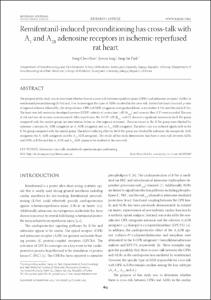KUMEL Repository
1. Journal Papers (연구논문)
1. School of Medicine (의과대학)
Dept. of Anesthesiology & Pain Medicine (마취통증의학)
Remifentanil-induced preconditioning has cross-talk with A1 and A2B adenosine receptors in ischemic-reperfused rat heart
- Keimyung Author(s)
- Lee, Yong Cheol
- Journal Title
- Bosnian Journal of Basic Medical Sciences
- Issued Date
- 2016
- Volume
- 16
- Issue
- 1
- Keyword
- Adenosine; Cross-talk; Remifentanil; Reperfusion; Preconditioning
- Abstract
- The purpose of this study was to determine whether there is a cross-talk between opioid receptors (OPRs) and adenosine receptors (ADRs) in remifentanil preconditioning (R-Pre) and, if so, to investigate the types of ADRs involved in the cross-talk. Isolated rat hearts received 30 min of regional ischemia followed by 2 hr of reperfusion. OPR and ADR antagonists were perfused from 10 min before R-Pre until the end of R-Pre. The heart rate, left ventricular developed pressure (LVDP),velocity of contraction (+dP/dtmax), and coronary flow (CF) were recorded. The area at risk and area of necrosis were measured. After reperfusion, the LVDP, +dP/dtmax,and CF showed a significant increase in the R-Pre group compared with the control group (no intervention before or after regional ischemia). These increases in the R-Pre group were blocked by naloxone, a nonspecific ADR antagonist, an A1 ADR antagonist, and an A2B ADR antagonist. The infarct size was reduced significantly in the R-Pre group compared with the control group. The infarct-reducing effect in the R-Pre group was blocked by naloxone, the nonspecific ADR antagonist, the A1 ADR antagonist, and the A2B ADR antagonist. The results of this study demonstrate that there is cross-talk between ADRs and OPRs in R-Pre and that A1 ADR and A2B ADR appear to be involved in the cross-talk.
- Keimyung Author(s)(Kor)
- 이용철
- Publisher
- School of Medicine
- Citation
- Yong-Cheol Lee et al. (2016). Remifentanil-induced preconditioning has cross-talk with A1 and A2B adenosine receptors in ischemic-reperfused rat heart. Bosnian Journal of Basic Medical Sciences, 16(1), 64–70. doi: 10.17305/bjbms.2016.738
- Type
- Article
- ISSN
- 1512-8601
- Appears in Collections:
- 1. School of Medicine (의과대학) > Dept. of Anesthesiology & Pain Medicine (마취통증의학)
- 파일 목록
-
-
Download
 oak-2016-0211.pdf
기타 데이터 / 803.62 kB / Adobe PDF
oak-2016-0211.pdf
기타 데이터 / 803.62 kB / Adobe PDF
-
Items in Repository are protected by copyright, with all rights reserved, unless otherwise indicated.